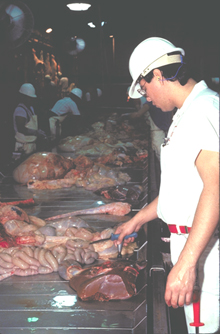| Issues
| | Social Issues... How many?
According to the International Labour Office (ILO), globally there are approximately 1.1 billion men and women working in agricultural production nearly half of which labour for wages. Add to this the numbers in processing, distribution and preparation, that totals about 1/4 of the world's workforce. How much?
Producers are getting less and less of the price you pay for food. UK producers receive 1/4 price of eggs and 2p for the wheat in a 50p loaf. Overseas producers get even less - a coffee or banana grower receives only 7-8% of the consumer price. 70-90% of fresh produce imported into the UK from Africa is controlled by supermarkets who pocket around 45% of the retail price while the farmers receive 17%. Farm workers have a hard job bargaining for a share of this remainder. Most farm workers in both developing and industrialised countries have historically been subject to exploitation, minimal pay, and poor living conditions. Many field workers are seasonally employed as 'pickers', many of whom are migrant and exploited for their cheap labour. Farm workers' conditions, isolation and their day to day relation with their employers, sometimes via "tied cottages", makes their bargaining position weak. | Conditions
Food processing workers work long hours in factory conditions. Gone has the fresh air and different jobs you do out of doors. Because many food processes are 24 hours - e.g bread and beer, workers have to work at all hours of day and night. Food service workers are often temporary, part-time or migrant workers.Many are on minumum wages, rely on tips, and are rarely allowed to organise to change things. | | |
Exploitation
The 20 Chinese cockle pickers drowned in Morecambe Bay in February 2004 are the tip of an iceberg of migrant labour working in many sectors of the food economy. While the cockles are estimated to be worth £8m, the pickers see little of this earning as little as a pound an hour. Seven gang workers were killed in the summer of 2003 on a level crossing because they couldnt read the warning signs. In Norfolk, gang workers were paid three pounds to cut 1,000 daffodils. There are an estimated 60,000 migrant workers and possible 3000 gangmasters. Regenerating countryside
Too often rural communities are treated as an issue happening somewhere else, rather than being seen as a crucial element in the development of our societies. Decisions that affect these rural lives are being taken by an increasingly small group of companies, particularly those in the retail sector. Monopolisation in the UK food industry is more than any other country. Alongside these major corporations are many small businesses loosing out - Small Farms Association |



